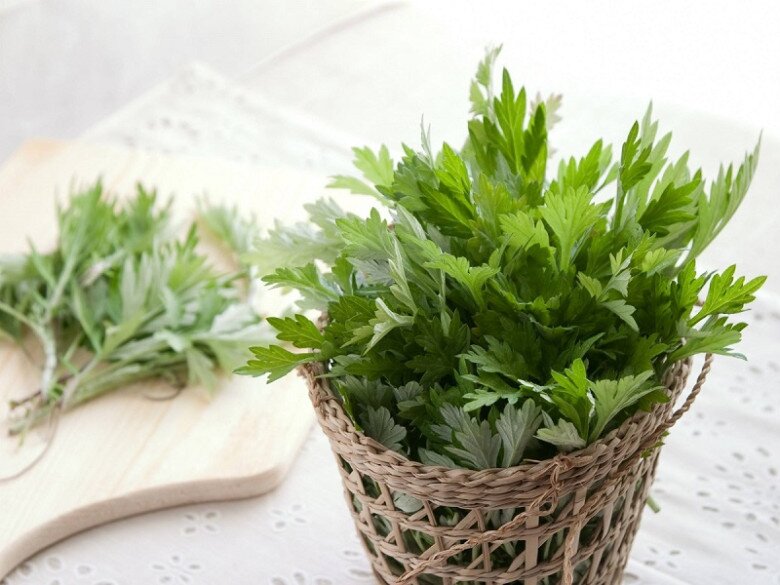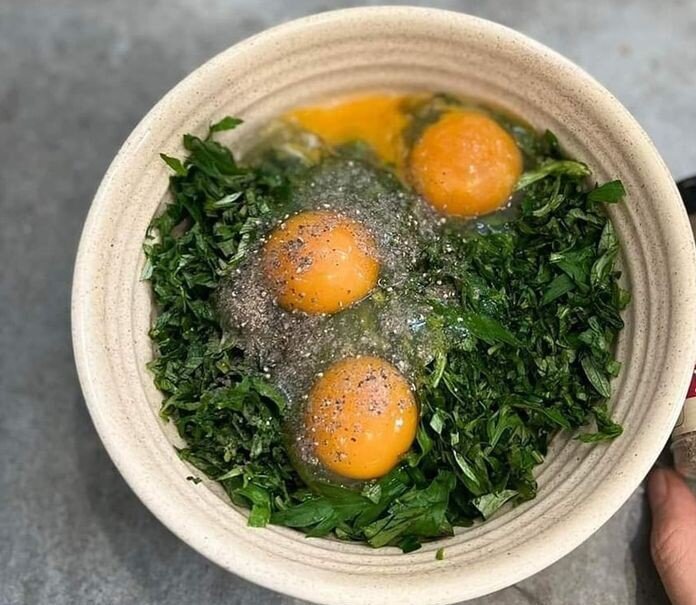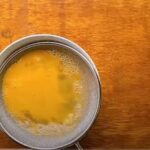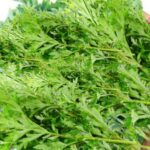Artemisia vulgaris, commonly known as mugwort, is an annual herb belonging to the Asteraceae family. What sets this vegetable apart is its year-round availability, resilience to pests, and low maintenance.
Research indicates that the leaves of mugwort contain a significant amount of essential oil. Monoterpenes, tetradecatrilin, dehydromatricaria ester, tricosanol, rachel ancol, and other compounds are the primary constituents of this oil.

Mugwort is a hardy plant that grows without much care. Illustrative image.
In Traditional Chinese Medicine, mugwort is extensively used in various medicinal formulas to treat common ailments. It is particularly effective in stanching bleeding, regulating menstruation, and alleviating headaches, diarrhea, and abdominal distension. Additionally, it is consumed as a daily vegetable by many families and is favored for its slightly bitter and aromatic taste.
On the other hand, eggs have a salty taste and a cold property. They are believed to soothe the five viscera, tonify qi and blood, moisten the throat, stabilize pregnancy, treat cough and asthma, dysentery, and restless fetus. The yolk, with its sweet taste and warm property, enters the heart, spleen, and stomach meridians. It nourishes yin, calms the mind, strengthens the spleen and stomach, and treats insomnia caused by yin deficiency.
According to Doctor Nguyen Van Thai, from the Institute of Radiation Medicine and Military Tumor, eggs are a commonplace food, whereas mugwort is a less palatable vegetable due to its distinctive aroma. Nonetheless, the young leaves and shoots of mugwort can be incorporated into dishes or combined with other ingredients to create delicious and nutritious meals. Specifically, the combination of eggs and mugwort not only yields a tasty dish but also offers therapeutic benefits, as outlined below:
Improving Blood Circulation: For individuals who frequently experience dizziness and blurred vision due to poor blood circulation, mugwort is recommended. Consuming mugwort leaves in daily meals, either cooked as a soup or fried with eggs on a weekly basis, can enhance cerebral blood flow.

Eggs paired with mugwort make for a delicious dish and an effective remedy. Illustrative image.
Treating Physical Debility: Mugwort is renowned in folk medicine as a highly effective tonic. Combining its leaves with lotus seeds and jujubes to braise black-boned chicken or eggs/duck embryos creates a nourishing dish that promotes qi and blood circulation, alleviates anorexia, and combats physical debility in individuals recovering from illness or suffering from prolonged sickness.
Alleviating Bone and Joint Disorders: Owing to its warm property, mugwort is commonly employed in remedies for bone and joint ailments. It facilitates blood and qi circulation, enhances blood flow to the skeletal system, and mitigates pain and inflammation, especially in individuals afflicted with spinal spurs and arthritis. Mugwort can be pounded to extract its juice, which is then mixed with honey for oral consumption, or it can be macerated and applied topically.
Regulating Menstruation: Mugwort’s warm property also renders it efficacious in alleviating menstrual cramps and lumbar pain. It serves as a remedy to regulate menstruation in women with irregular periods.
Hemostasis: The constituents of mugwort exert beneficial effects in hemostasis, inflammation reduction, antimicrobial action, and pain relief. Consequently, it is a valuable remedy for emergency first aid, particularly in cases of injury, limb amputation, or snakebites.
Precautions when consuming mugwort
According to Doctor CKI Duong Ngoc Van, mugwort is recognized for its myriad health benefits and therapeutic properties. However, caution is warranted in its daily consumption and medicinal usage. Folk wisdom also cautions against excessive mugwort intake, which may lead to poisoning. Improper use can result in adverse effects. Therefore, the following considerations should be heeded when consuming mugwort:

Stir-fried eggs with mugwort help improve blood circulation. Illustrative image.
– Avoid excessive consumption of mugwort. Limit intake to a maximum of 5 shoots per serving, and consume it no more than 3 times a week.
– Pregnant women or those with a history of miscarriage or preterm labor should refrain from consuming mugwort.
– Nursing mothers should also abstain from daily mugwort consumption.
– Do not use mugwort medicinally in conjunction with antidepressants, antidiabetic drugs, anticoagulants, anticancer agents, or antibiotics, as it may interact and counteract the effects of these medications.
– Exercise caution when using mugwort for individuals with a sensitive constitution toward herbal remedies.
– Do not consume mugwort continuously for more than 4 weeks.
The Healing Power of Wormwood: Unveiling the Ancient Wisdom of This Herbal Plant
Absinthe, or as some may call it, the “Green Fairy”, is a mystical herb with a long history of use in traditional medicine and cultural rituals. This humble yet powerful plant, known scientifically as Artemisia Absinthium, has captured the fascination of many with its alleged magical properties and distinctive bitter flavor. In ancient times, it was believed that planting absinthe in front of one’s home brought good fortune and warded off evil spirits. Today, it continues to captivate imaginations and inspire culinary creations and artisanal beverages.
The Ancient’s Advice: In July, the Month of Wandering Spirits, Carry These 7 Items to Ward Off Bad Luck
In many cultures, the 7th month of the lunar calendar is considered an unlucky period. It is believed that during this time, negative energies are more prevalent, and one may encounter misfortune. To counter this, people often carry protective amulets or talismans when they leave the house, believing that these objects will ward off bad luck and keep them safe.





































